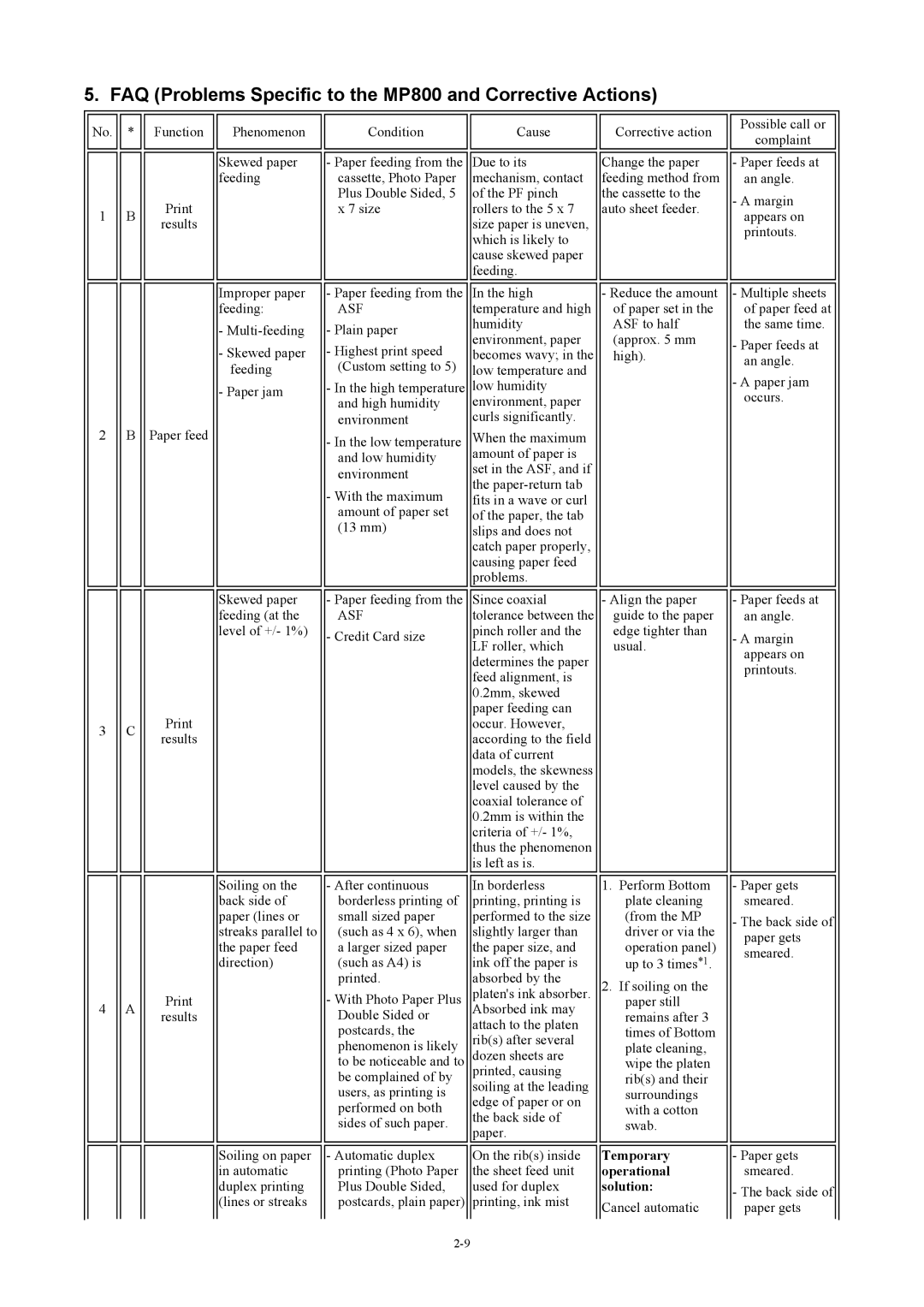
5. FAQ (Problems Specific to the MP800 and Corrective Actions)
No. * Function | Phenomenon |
Condition | Cause | Corrective action |
Possible call or
complaint
Skewed paper feeding
1 B Print results
Improper paper feeding:
-
- Skewed paper feeding
- Paper jam
2 B Paper feed
Skewed paper feeding (at the level of +/- 1%)
3 C Print results
Soiling on the back side of paper (lines or streaks parallel to the paper feed direction)
4 A Print results
Soiling on paper in automatic duplex printing (lines or streaks
-Paper feeding from the cassette, Photo Paper Plus Double Sided, 5
x7 size
-Paper feeding from the
ASF
-Plain paper
-Highest print speed (Custom setting to 5)
-In the high temperature and high humidity environment
-In the low temperature and low humidity environment
-With the maximum amount of paper set (13 mm)
-Paper feeding from the
ASF
-Credit Card size
-After continuous borderless printing of small sized paper (such as 4 x 6), when a larger sized paper (such as A4) is printed.
-With Photo Paper Plus Double Sided or postcards, the phenomenon is likely to be noticeable and to be complained of by users, as printing is performed on both sides of such paper.
-Automatic duplex printing (Photo Paper Plus Double Sided, postcards, plain paper)
Due to its mechanism, contact of the PF pinch rollers to the 5 x 7 size paper is uneven, which is likely to cause skewed paper feeding.
In the high temperature and high humidity environment, paper becomes wavy; in the low temperature and low humidity environment, paper curls significantly.
When the maximum amount of paper is set in the ASF, and if the
Since coaxial tolerance between the pinch roller and the LF roller, which determines the paper feed alignment, is 0.2mm, skewed paper feeding can occur. However, according to the field data of current models, the skewness level caused by the coaxial tolerance of 0.2mm is within the criteria of +/- 1%, thus the phenomenon is left as is.
In borderless printing, printing is performed to the size slightly larger than the paper size, and ink off the paper is absorbed by the platen's ink absorber. Absorbed ink may attach to the platen rib(s) after several dozen sheets are printed, causing soiling at the leading edge of paper or on the back side of paper.
On the rib(s) inside the sheet feed unit used for duplex printing, ink mist
Change the paper feeding method from the cassette to the auto sheet feeder.
-Reduce the amount of paper set in the ASF to half (approx. 5 mm high).
-Align the paper guide to the paper edge tighter than usual.
1.Perform Bottom plate cleaning (from the MP driver or via the operation panel) up to 3 times*1.
2.If soiling on the paper still remains after 3 times of Bottom plate cleaning, wipe the platen rib(s) and their surroundings with a cotton swab.
Temporary operational solution:
Cancel automatic
-Paper feeds at an angle.
-A margin appears on printouts.
-Multiple sheets of paper feed at the same time.
-Paper feeds at an angle.
-A paper jam occurs.
-Paper feeds at an angle.
-A margin appears on printouts.
-Paper gets smeared.
-The back side of paper gets smeared.
-Paper gets smeared.
-The back side of paper gets
